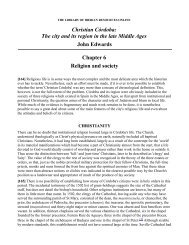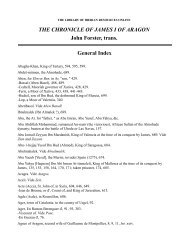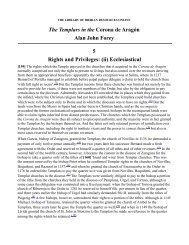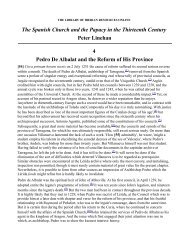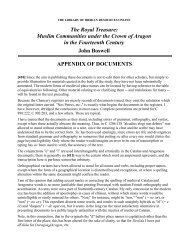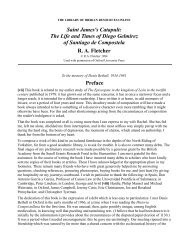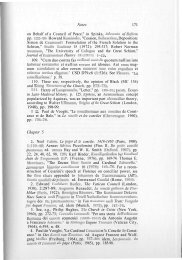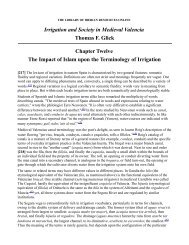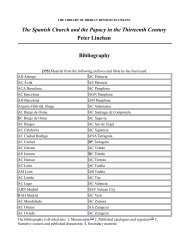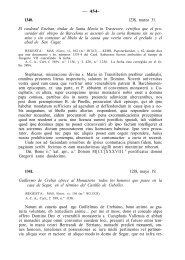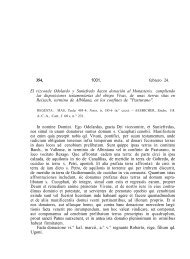PROTESTANTISM - The Library of Iberian Resources Online
PROTESTANTISM - The Library of Iberian Resources Online
PROTESTANTISM - The Library of Iberian Resources Online
You also want an ePaper? Increase the reach of your titles
YUMPU automatically turns print PDFs into web optimized ePapers that Google loves.
een necessary to enable Philip III to enter into the treaty <strong>of</strong> 1605; now that the peace had been broken<br />
and the causes <strong>of</strong> the papal permission had ceased, he was, as inquisitor-general, obliged in conscience<br />
to obviate the evils <strong>of</strong> Catholic intercourse with such pertinacious and pernicious heretics as the<br />
English and Scotch, by not permitting them to remain in his Majesty's dominions, for otherwise he<br />
would be lacking in his duty to the king and to his <strong>of</strong>fice. He had therefore ordered an edict to be<br />
published that all Englishmen and Scotchmen, who were not Catholics, should leave the king's<br />
dominions within twenty days, notifying them that after that date they would be punished by the Holy<br />
Office. As it was a weighty matter, <strong>of</strong> which the king should be notified, Pacheco added that he had not<br />
wished to execute it without informing him and he could issue such orders as he saw fit. (131) It may be<br />
assumed that Philip did not approve <strong>of</strong> this insolent invasion <strong>of</strong> the royal power, for it was not till April<br />
22, 1626, that he issued a proclamation forbidding all commercial intercourse with England and<br />
ordering the confiscation <strong>of</strong> all English goods imported in contravention <strong>of</strong> its commands, when the<br />
Inquisition followed by a carta acordada <strong>of</strong> May 29th, prescribing the prosecution, in the regular way,<br />
<strong>of</strong> all English heretics who had sinned against the faith. (132)<br />
When peace was restored, in 1630, article 19 <strong>of</strong> the treaty revived the article <strong>of</strong> 1604 and Philip, as<br />
before, promised to provide that English subjects should not be molested so long as they caused no<br />
scandal. (133) As before, the Suprema followed this, January 28, 1631, with detailed instructions that<br />
those who kept house should be treated as Spanish subjects and be subjected to special surveillance.<br />
(134) This unjustifiable distinction between transient and [467] resident foreigners gave ample<br />
opportunity for molestation and blackmail. It was construed as applying the Index <strong>of</strong> prohibited books<br />
to residents for, in 1645, we find the Canary tribunal ordering its commissioner at Orotava to search the<br />
houses <strong>of</strong> the English merchants and report whether they found any forbidden books or books that had<br />
not passed the censure. <strong>The</strong> duty was performed and lists were forwarded, not only <strong>of</strong> books but <strong>of</strong><br />
pictures and prints and, as nothing objectionable was reported, we may not uncharitably surmise that<br />
the commissioner's labor was not unpr<strong>of</strong>itable. (135) As the rule had no legal basis, it probably called<br />
forth protests for, in 1652, the Suprema submitted the question <strong>of</strong> its legality to a number <strong>of</strong><br />
calificadores, who unanimously agreed that it was not in accordance with the treaties, when presumably<br />
it was withdrawn. (136) <strong>The</strong> espionage to which foreign merchants were exposed is portrayed, in 1648,<br />
by Pedro de Villareal, commissioner at Bilbao, who reports that there were sixteen houses in which the<br />
English and Dutch traders were lodged; he was confident that nothing heretical could escape his<br />
knowledge, for the keepers <strong>of</strong> the houses were faithful spies and very zealous in matters <strong>of</strong> religion.<br />
(137)<br />
A treaty <strong>of</strong> commerce with Denmark, in 1641, placed the Danes on the same footing as the English and,<br />
in the treaty <strong>of</strong> Munster, January 30, 1648, the Dutch obtained the same terms, while a special article<br />
placed the Hanse towns on the same footing as Holland. (138)<br />
Meanwhile, in 1645, the English merchants in Andalusia, by a payment <strong>of</strong> twenty-five hundred ducats<br />
in silver, had secured certain commercial privileges, one <strong>of</strong> which indicates how grudgingly their treaty<br />
rights had been interpreted. A foreign heretic [468] appearing in court, either as party or witness, was<br />
asked whether he was a Catholic; if he replied in the negative, his oath was not received. This<br />
humiliating and injurious distinction was abrogated, and the Englishman's oath was declared to be legal<br />
and binding, like the Spaniard's, but it was difficult to make the courts accept the innovation, and the<br />
royal order, issued March 19th had to be repeated June 26th and again November 9th. By the Munster<br />
treaties this privilege was extended to Holland and the Hanse towns, and it was confirmed by the treaty<br />
<strong>of</strong> Utrecht in 1713. (139)



